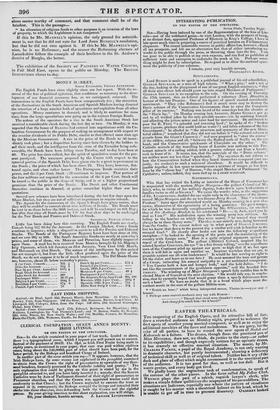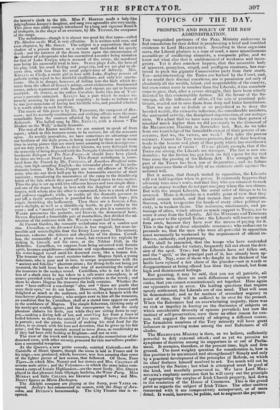EASTER THEATRICALS.
THE reopening of the English Opera, and its attractive bill of fare, drew a crowded audience on Monday night, prepared to welcome the first opera of another young musical composer, as well as to enjoy the additional novelties of the farce and melodiarna. We are lorry, for the sake of all parties, to have to record the new opera of Sadah and Kalasrade as a failure. The drama, though from the practised pen of Miss Minoan, does not, we think, do justice to the story—or rather to its capabilities ; and though expressly written for an operatic drama, it has scarcely an effective musical situation. The music, by Mr. CHARLES PACKER, a pupil of the Royal Academy, is not only wanting in dramatic character, but poorly instrumented ; showing a deficiency of technical skill as well as of original talent. Neither has it any of the dash and glare of effect which might recommend it to the uncritical part of the audience. It is too good for that, as well as too dull. But it wants genius, and every body got tired. We gladly leave the ungracious task of condemnation, to speak of the success of the other pieces. In the farce called My Fellow Clerk, WRENCH plays the part of a rakish, roguish lawyer's clerk, who makes a simple fellow quilldriver the scapegoat of his peccadilloes. The situations are ludicrous, especially one where the pattern of steadiness is caught by his master with a theatrical helmet on his head, which be is unable to get off in time to prevent discovery. OXBERRY looked the lawyer's clerk to the life. Miss P. Hoaxing made a lady-like bdginghouse-keeper's daughter, and sang two agreeable airs very nicely.
This piece was oddly enough introduced by along and vigorous flourish of trumpets, in the shape of an overture, by Mr. TtaTosr, the composer of the songs.
The melodrama—though it is almost too good for that name—called The Shadow on the Wall, is very effective. It is written with care, and even elegance, by Mr. SERLE. The subject is a superstition that the
shadow of a person thrown on a certain wall foreboded his speedy
death : and the interest of the drama turns upon the circumstance of tee shadow of a desperado who has committed a murder being mistaken
for that of Luke Evelyn, who is accused of the crime, the murdered
man being his successful rival in love. SMILE plays Luke, the hero of his play, with his usual feeling and propriety, and we are glad to ob-
serve also, with less than his usual pulpit-tone of delivery. Mrs.
KEELEY, as Cies/is, a rustic girl in love with Luke, displays powers of pathetic acting equal to her mirthful ebullitions, and only less sponta- neous. She is in danger, however, of falling into the fault which de- tracts from the effect of SERLE'S acting—over-elaboration. Sentimental scenes, unless represented with breadth and vigour, are apt to become
mawkish. 0. SMITH, as the ruffian Cavalier, looks like one of VAN- DYKE'S portraits animated. KEELEY has a part which lie makes ex- tremely amusing by his perplexed stupidity : be looks as forlorn as if lie was just conscious of having lost his little wits, and puzzled whether it is worth while to seek for them.
The music of this piece is by Mr. THOMSON, the composer of Her- mann ; and its masterly combinations and striking effects were the more remarkable from the contrast afforded by the music of &auk and Kalusrade. The ballad sung by Mrs. KEELEY, with a chorus " The Shadow on the Wall," is finely dramatic. The rest of the Easter novelties we are content to speak of from report ; which in this instance seems to be correct, for all the accounts agree. As weekly journalists, we have sometimes an advantage over our brethren of the daily press, in being warned by them not to waste time in seeing pieces that are much more amusing in their descriptions : and we duly prize it. Thanks to their labours, we were delivered from the necessity of being disgusted with the Newgate Calendar incidents and bombastic dialogue of The Note-Forger—it should have been plural, for there are two—at Drury Lane. This dismal melodrama is trans- lated from the French by Mr. FITZBALL, of Jonathan Brarlybrd noto- riety, into high-sounding English—the vernacular phrase of his melo- dramatic heroes. The Note. Forgersare two old officers of Wolfe's army, who eke out their half-pay by this honourable exercise of their ingenuity ; transferring the manceuvres of the camp to the thimble-rig booth of the fair, where they pass off their forged notes to two rustics. Thus the play is set up with two villanous heroes and two simple ditto : and one of the dupes being in love with the daughter of one of the forgers, with whom also the other is enamoured, here is a stock of love and jealousy supplied ; while, to enable all the dramatis personw to pair off, a rustic sweetheart is provided for the clownish dupe ; this couple furnishing the buffoonery. Then there are a furnace, a flue, and a skylight, as well as a thimble-rig booth, to give reality to the scene ; and a " mortal combat" with swords, to give it a romantic air. WARM personates the pathetic, and Detsvre the demoniacal hero ; DENYIL displayed a formidable pair of mustachios, that divided the ad- miration of the audience with Mr. WARDE'S sugar-loaf buttons.
At Covent Garden, the romantic melodrama was of a sombre sort also. Carmilhan, or the Drowned Crew, is less tragical, but more im- possible and unintelligible than the Drury Lane piece. The scenery, however, redeems the dulness and obscurity of the drama. Carrnil- ban, the commander of a pirate vessel, has crowned his exploits by sinking it, himself, and his crew, at the Nikkur Holl, in the Hebrides. Carmilhan, we suppose from being saturated with Satanic spirit, becomes amphibious—submarine and superhuman—and lives in his water-logged vessel amid his drowned crew, like a human fish. The treasure that the vessel contains induces Magnus Spiel, a young fisherman, who is poor and in love, to scrape acquaintance with the " ancient and fish-like" phantom pirate; for diving-bells not being yet invented, the bold lover has no other way of ascertaining the value of the treasures in the sunken vessel. Carnailhan, who is not a bit the less of a shark since he has taken to a salt-water atmosphere, is of course provided with a spell to transport his victims to the wreck ; mid there he shows Magnus the treasures the hulk contains. Whether the crew "have suffered a sea-change "also, and "those are pearls that were their eyes," we do not learn. However, Magnus is amazed and delighted as much as the audience, and he strikes a bargain with the treacherous phantom-pirate ; who assigns over to him all the treasures, on condition that he, Carmilhan, shall at a stated time appear on earth in the semblance of Magnus. The simple fisherman, thinking only of his newly-got wealth, agrees; and the consequence is, that the scaly phantom abducts his bride, just while they are sitting down to sups per,—making a diving belle of her, and snatching her from a feast of heeled lobsters to share the society of live ones. Magnus dives down in pursuit; and the pirate, instead of making his rival food for the fishes, is so struck with his love and devotion, that be gives up his fair prize ; and the happy mortals ascend to terra firma, as comfortably as if they had been only bathing at Brighton—and not so wet. The view of the wreck and its treasures, and the resuscitation of the drowned crew, with other scenery, procured for this marvellous produc- tion a successful reception. At the Queen's, a new petite comedy, entitled Gabrielle—not the Gabrielle of Henri Quatre, though the scene is laid in France and in his reign—was produced, which, however, was less amusing than some of the lighter, .pieces of last season, that followed. Of these, Tame Tagers—in which Mrs. NISBET and her sisters and Mrs. CHAPMAN all assume male attire; and the Volunteers—in which the same ladies com- mand a.corps of female Highlanders—are the most lively. Mrs. ORGER layed in that pleasant little Olympic burletta, the Water Party. Miss MURRAY and little COLLIER are likewise engaged here; and Mrs. HONEY figures as Maria Darlington. The Adelphi company are playing at the Surry, poor YATES ex. cepted. Astley's has commenced its season, with the Siege of Jeru- sakm, and Decaow's horsemanship. The City Theatre also is re- opened.



























 Previous page
Previous page